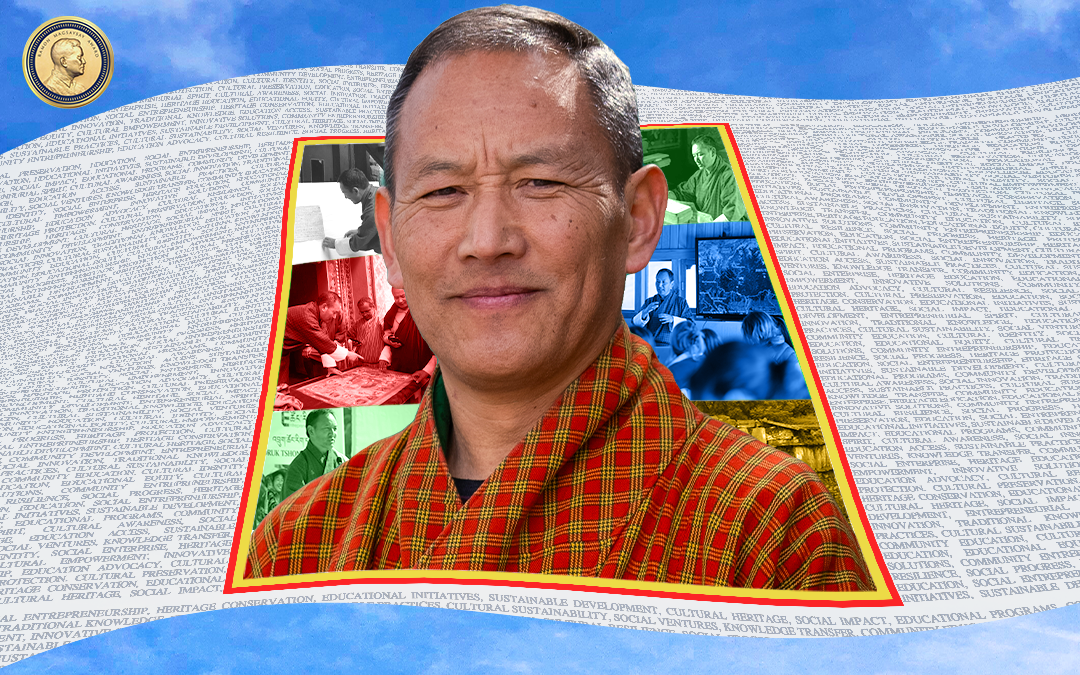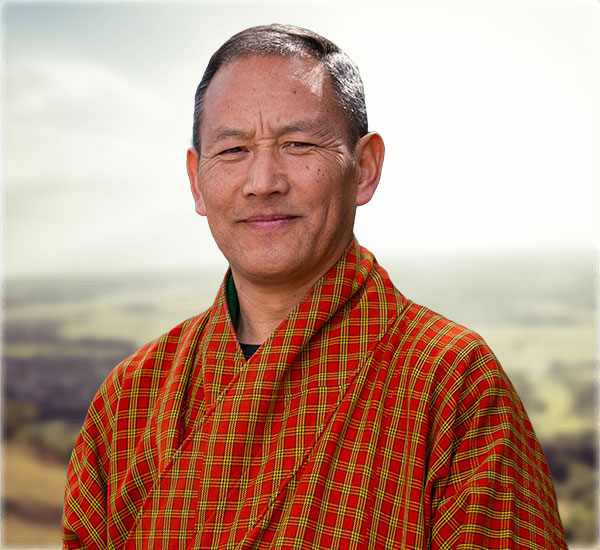- Despite Bhutan’s reputation for Gross National Happiness, the country faces significant challenges, including poverty, youth migration, and tensions from rapid modernization and globalization.
- KARMA PHUNTSHO, a Bhutanese thought leader, founded the Loden Foundation in 1999, an educational charity “committed to promoting education, nurturing social entrepreneurship, and documenting Bhutan’s cultural heritage and traditions.”
- Loden prioritizes social value and ethical business practices to promote a caring economy, funding 295 entrepreneurs (including 97 women), creating 860 jobs, and training 5,750 aspiring entrepreneurs since 2008.
- To preserve Bhutan’s cultural traditions, Loden has documented 3,348 hours of intangible culture, digitized 4.55 million pages of texts, captured 150,000 images of art and artifacts, and supported sixty-one cultural projects.
- The RMAF board of trustees recognizes his invaluable and enduring contributions towards harmonizing the richness of his country’s past with the diverse predicaments and prospects of its present, inspiring young Bhutanese to be proud of their heritage and confident in their future. Beyond his immediate horizon, his work engages all peoples and cultures around the world facing the same challenges, reminding them to look back even as they move forward.
Standing on the eastern edge of the Himalayas, the Kingdom of Bhutan has been described as the last Shangri-la. Its relative seclusion and natural beauty make it one of the world’s most desirable places for tourists to visit. But Bhutan is a low-income country facing many of the same problems and challenges confronting other developing countries: unemployment, inadequate social services, and the erosion of traditional values.
Despite being famous for Gross National Happiness, a holistic development philosophy which gained traction in some countries, Bhutan continues to face many challenges. About 12% of its population live below the poverty line and many youths are seeking greener pastures abroad. With rapid change taking place due to modernization and globalization, Bhutan has been experiencing serious tensions.
This reality has been foremost in the mind of KARMA PHUNTSHO, a Bhutanese thought leader who, as a former Buddhist monk, has a profound understanding of Bhutanese tradition. But PHUNTSHO—born in Bhutan in 1968—is also an Oxford-educated scholar who feels the need to bring Bhutan into the 21st century in a mindful and culturally sensitive way. His academic works in the field of Buddhism and Bhutan’s history and culture focus on reappropriating Bhutanese traditional knowledge and making them relevant to the present and future.
In addition to numerous academic publications on history, religion, and culture including his groundbreaking History of Bhutan, he regularly writes and speaks in mainstream national media as well as on social media on social and cultural issues. He is a leading member of the fledgling Bhutanese academic community and his village solidarity group. For the past twenty years, he has returned to his village in Central Bhutan annually to help put on the Yakchoe Festival, which is today attended by some 500 international tourists.
In 1999, PHUNTSHO founded the Loden Foundation, an educational charity “committed to promoting education, nurturing social entrepreneurship, and documenting Bhutan’s cultural heritage and traditions.” The works of Loden Foundation mirror PHUNTSHO’s own aspirations and interests as a scholar and changemaker. Loden literally means “possessing intelligence,” but it is grounded in the Buddhist belief that knowledge has no owner, and that empowerment through education is the greatest gift.
Begun as a scheme to support poor but deserving students in Bhutan, the foundation is registered as a civil society organization with partners in many countries. Until 2008, when the first staff was hired, the foundation was entirely operated by PHUNTSHO and other volunteers. Headquartered in the capital Thimphu, Loden Foundation has projects in all twenty administrative districts of Bhutan.
Loden’s accomplishments have been impressive and life-changing. In education, it has established five preschools, funded 219 students through school, awarded ninety-eight college scholarships, and held sixty-three Bhutan Dialogue Sessions for public education. In entrepreneurship, Loden has addressed the problem of youth unemployment in Bhutan by helping them to become social entrepreneurs through loans, mentorship, and capacity-building.
Veering away from traditional business approaches, Loden emphasizes social value over profit, and responsible and ethical business practices hoping to foster a caring economy and a culture of responsible production and intelligent consumption. The program has funded 295 entrepreneurs (ninety-seven of whom are women) creating 860 jobs, with 5,750 more aspiring entrepreneurs trained since 2008.
Acutely aware of the need to preserve and promote Bhutan’s rich cultural traditions, Loden has focused on documenting and digitizing its oral and written heritage. This has so far resulted in 3,348 hours of recordings of intangible culture, 4.55 million pages of digital texts from seventy-six libraries, 150,000 pictures of old art and artifacts, and sixty-one culture projects.
While these were achieved through collective effort, none would have been possible without the personal vision and dedication of PHUNTSHO, whose thoughts, words and actions guide these programs. Calling himself a “pracademic”—he practices what he preaches as an exemplar of humility, responsibility, and commitment, while nurturing young new leaders to take over from him.
As modern as his outlook is, his vision continues to be informed by his deep spirituality. “We really need to have this focus on the mind, the primary ingredient of happiness, because as soon as you start to think happiness is out there, then we will end up being more materialistic, just like others, and lose that traditional approach,” he says. “With so much distraction and confusion caused by the digital revolution, there is today even a greater need for such inward reflection and focus. That’s why Buddhist culture is so important for the future of Bhutan.” One of his current projects is establishing the Bodhitse Center for Study and Contemplation, using his own resources.
In electing KARMA PHUNTSHO to receive the 2024 Ramon Magsaysay Award, the board of trustees recognizes his invaluable and enduring contributions towards harmonizing the richness of his country’s past with the diverse predicaments and prospects of its present, inspiring young Bhutanese to be proud of their heritage and confident in their future. Beyond his immediate horizon, his work engages all peoples and cultures around the world facing the same challenges, reminding them to look back even as they move forward.
The Board of Trustees of the Ramon Magsaysay Award Foundation, my fellow Ramon Magsaysay Awardees, honored guests, ladies and gentlemen,
Kuzuzangpola. I bring you greetings from the King and people of Bhutan, (prayer flags from Bhutan to highlight the backdrop you have chosen for this year.)
I am deeply humbled to be one of the recipients of Ramon Magsaysay Award this year and to be the first one from Bhutan. Yes, I have done voluntary charity work for 25 years, but I did not even dream of receiving such an honor.
Bhutan is a small country, with a population of about 770,000 people. So, in numbers what we do is tiny compared to the great works carried out by other Magsaysay Laureates in bigger countries. Thus, I would like to express my deepest appreciation to my fellow Magsaysay Laureates both past and present, and sincerest gratitude to the Foundation for the recognition of their works.
What Bhutan lacks in numbers and size, we try to make up in inner spirit and sense. Bhutan was one of the last nations to start the process of modernization. It has seen its first streets and cars only some sixty years ago. Yet Bhutan has been bold in charting a new trajectory of development and human progress by balancing tradition with modernity, economic development with environment conservation, and material comfort with spiritual wellbeing. It pursues a holistic goal of Gross National Happiness.
Bhutan may not be the happiest place on earth, as some travel publicity material may have you believe. It has only last year graduated from Least Developed Country category and is grappling with its share of problems. But it is the first carbon negative country with a constitutional commitment to keep 60% of the country under forest cover for perpetuity. We have made serious efforts to pursue human wellbeing in its totality.
In this regard, I see this award as token of recognition of Bhutan’s pursuit of holistic development under the visionary leadership of Their Majesties. I take this also as an appreciation of work of the civil society organizations in Bhutan. More specifically, I would like to dedicate this to hundreds of friends who have joined me in the non-profit projects I have been involved in, the primary one being the Loden Foundation and its three programmes of supporting education, its social ‘Buddhist’ entrepreneurship programme to promote an intelligent business culture of responsible production and mindful consumption, and its culture programme to preserve and promote Bhutan’s traditional practice of wisdom and compassion.
I am joined here by my colleague Sangay Tshering, once a beneficiary of Loden and now the President of Loden in Bhutan, Kinley our communications officer, and Anne and Gerard Tardy, active members and supporters of Loden and friends from France.
Friends, humanity today is going the most alarming pace of change. Our species, homo sapiens, has been around for over 300,000 years but the industrial revolution in the last 300 years has fundamentally changed human existence.
Today, the digital revolution, which is only about 30 years old, is again transforming our way of life. We talk about advances in artificial intelligence, but human intelligence remains fickle and confused as never before. We face multiple challenges of climate change, war, rising inequality, rampant stress and restlessness.
The primary cause of today’s problems is not out there in nature or the material world but here in us—in human greed, hatred and ignorance. The solution to these problems also primarily lies in the human mind, in our understanding of the interdependence and interconnectedness, in empathy and compassion, in courage and resilience, in acumen and wisdom, and in selfless service and greatness of spirit—the ideals and values Ramon Magsaysay Award celebrates.
Through my work in culture and efforts to make our cultural values and practices relevant to our present time, I have come to believe that our ancient wisdom traditions have much to offer us today as they did in the past. Looking back can help us find a new and better way forward. A person who does not remember where he came from will never reach his destination, as those of you familiar with the Filipino proverb would know.
Let me conclude with a prayer that epitomizes the highest human ideal and is fitting for the occasion.
“As long as space exists
So long as sentient beings remain,
May I too remain
To dispel the misery of the world.”
Related Articles

Ramon Magsaysay Award Names First Bhutanese Recipient in 66 years
Sep 5, 2024

